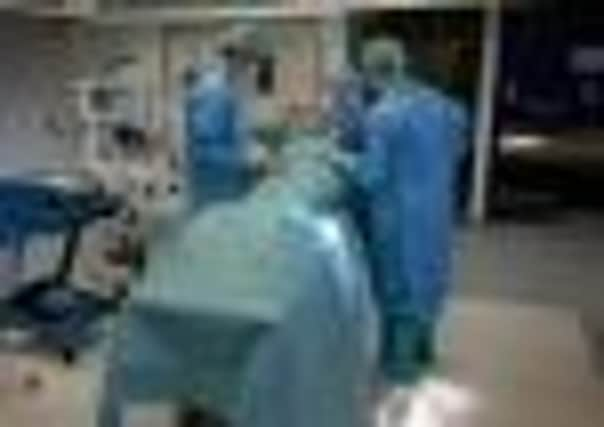David Davis: Why Leeds needs to be at heart of children’s surgery


It’s even tougher when the lives of very sick children are at stake.
Last week, Westminster MPs debated the independent review set up three years ago to examine how best to provide surgery for children born with heart problems.
Advertisement
Hide AdAdvertisement
Hide AdIt looked at the performance of all 11 children’s heart units in England, and has decided that fewer, larger paediatric heart units would provide better treatment.
There is logic in this argument.
Paediatric heart surgery is risky, complex and highly specialised. Only 70 surgical procedures a week are carried out on children with congenital heart defects.
To put that in perspective, the NHS performs more than 800 cataract operations and around 250 hip replacements every single day.
At present, England’s 30 consultant paediatric cardiac surgeons are thinly spread across 11 hospitals.
Advertisement
Hide AdAdvertisement
Hide AdIt would make sense for them to work in larger teams where they can share expertise and potentially save more lives.
Of course, this means that some children’s heart units will have to close, and the unit at Leeds General Infirmary is under threat.
The review put forward four options for the future of children’s cardiac care. The bad news for patients in Yorkshire is that only one of these options would see the children’s heart unit at Leeds kept open.
A final decision will be made in the autumn. If Leeds General Infirmary is deemed surplus to requirements, it could stop providing children’s heart surgery by 2013.
Advertisement
Hide AdAdvertisement
Hide AdFor those children who depend on Leeds for specialist cardiac care, the closure of this unit could mean travelling to Newcastle instead – a 200-mile round trip.
Of course, parents will travel as far as necessary to get the best possible treatment for their child. If the LGI was not up to scratch and Newcastle offered the best care, then what parent would refuse to go the extra mile?
This is relevant because a few years back, a report criticised Leeds’s children’s heart unit after it identified a number of “excessive” deaths there.
In particular, questions were asked about the LGI’s record on Tetralogy of Fallot surgery. Between 2003 and 2006, the LGI had almost as many fatalities following Tetralogy of Fallot surgery as the other 10 paediatric heart units combined.
Advertisement
Hide AdAdvertisement
Hide AdBut this has changed. Leeds’s performance is now as good as any unit in the UK. There is now a very strong case to retain Leeds’s children’s heart unit.
First, Leeds General Infirmary has one of the largest children’s hospitals in the country. It now serves 5.5 million people, and the unit sees 10,000 children every year. What is more, LGI has recently centralised services to provide the widest possible range of paediatric healthcare under one roof.
This brings huge benefits to patients. It means if a child experiences complications during heart surgery and needs an intestinal surgeon, a neurosurgeon, or renal therapy, that child can get help immediately. The alternative is a life-threatening delay while the child is transferred to another hospital.
Second, Leeds General Infirmary is well-placed to meet rising demand. The Government’s review wants every children’s heart unit to have four surgeons and perform at least 400 procedures a year.
Advertisement
Hide AdAdvertisement
Hide AdLast year, Leeds Teaching Hospitals Trust (which runs the LGI) delivered 372 cardiac operations for children, and is now recruiting a fourth surgeon.
By the time the review’s recommendations are implemented, Leeds General Infirmary will have met all the criteria for a modern children’s heart unit.
Third, and most important, is that the LGI now provides excellent care, and is held in high regard by professionals and patients alike.
But you don’t have to take my word for it. The British Congenital Cardiac Association has praised Leeds General Infirmary children’s hospital for providing “gold standard” care. It is currently one of only two English hospitals to offer this level of service.
Advertisement
Hide AdAdvertisement
Hide AdOver the past six years, survival rates at Leeds for paediatric heart surgery have improved dramatically. On average, for every 100 children who had this surgery, 94 were doing well a year later. Given the risk involved, this demonstrates excellent performance and compares well with other children’s heart units.
That’s why the Save Our Surgery petition, signed by more than half-a-million people, was the biggest petition ever collected in Yorkshire.
There are some difficult decisions ahead. Whichever way the review goes, four or five hospitals will lose their children’s heart surgery units. As they consider the options, the decision-makers should have one thought in their minds: how best to save the lives of as many children born with heart defects as possible.
But the evidence is now clear. As it considers its decision, the review team should recognise that the children’s heart unit at LGI should be an essential part of the solution.
David Davis is the Conservative MP for Haltemprice and Howden.